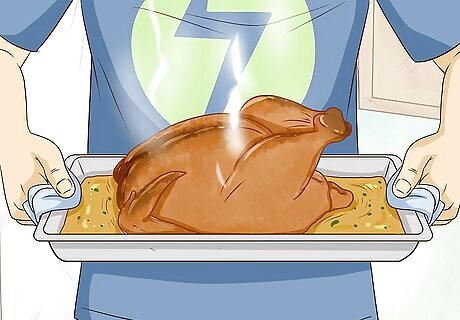
views
Divide responsibilities with your partner.

Clearly define your expectations of each other. The definition of a good house husband varies from family to family, so it’s important to discuss your specific duties and responsibilities with your partner. What are the things that need to be done to keep the household running smoothly? Which tasks will you be in charge of completing, and which chores will family members pitch in with? Will you be the sole person in charge of cooking dinner, or will you alternate days with your partner, or order takeout sometimes? Make sure you and your partner are on the same page about these things to avoid any misunderstandings!
Take the job of being a homemaker seriously.

A house husband's tasks are important, so treat them as such. This means caring for the children, cooking meals, keeping things clean and tidy, taking care of any repairs or maintenance, and using decor to make the space feel home-y. Being a successful house husband will require a lot of time and effort, so it’s important to take it as seriously as you would take any other job!
Take pride in your cooking.

Learn to make yummy, healthy meals for your family. If you’re new to cooking, look for good recipes in cookbooks or online, or check out some instructional cooking videos on Youtube. If you already love to cook, start experimenting with exciting new dishes and flavors. A delicious home-cooked meal is a beautiful expression of love for your family. Plus, they also tend to be healthier and less expensive than takeout! Slow-cooker or crock pot recipes are great options if you’re a beginner. This handy appliance can make soups, stews, pasta dishes, veggies, and much more. They’re also fairly low-effort, and they give you the chance to get other chores done while the food cooks! Meal prepping can also make things less stressful. This involves preparing a dish (or key elements of a dish, such as grains or proteins) in advance, so all you need to do is heat it up when the time comes. For example, you could cook a large amount of roasted veggies and chicken on a Sunday night to use in various dishes throughout the week.
Establish a consistent daily routine.

Create a schedule for yourself so you can easily juggle your tasks. These tasks include cooking, cleaning, doing laundry, grocery shopping, caring for the children, driving them to and from school, and much more. It’s important to plan your days out, so you can stay on top of all of these commitments and avoid getting overwhelmed. For example, if you have young children, pick a consistent time for their naps and meals each day. This way, you can plan out the rest of your chores around these times. Schedule a weekly grocery shopping trip. It’s much more efficient to get all the items you’ll need for the week in one trip, rather than making several small groceries runs on multiple days.
Manage the family’s schedule.

Keep track of important appointments and events so things run smoothly. From birthdays and anniversaries to sports practices and school obligations, there’s a lot to keep track for your household to run smoothly! As a house husband, it’s your job to stay on top of all these moving parts. Write your family’s schedule down in a daily planner, or on a wall calendar. This will help make sure you don’t forget any important obligations!
Do everything with love.

Love is an important ingredient for a successful household. Tell your partner and children that you love them often, and be sure to always treat them with kindness and respect. Spend quality time with your kids, whether this be taking them to the park, doing arts and crafts together, or having family dinners every night. And, of course, make an effort to go on date nights and spend one-on-one time with your partner to keep your relationship healthy.
Find time for self-care.

To effectively care for your family, you also need to take care of yourself. This means looking after your mental and physical health, finding time to relax and decompress, and pursuing your own individual interests and passions. EXPERT TIP Asa Don Brown, PhD, DNCCM, FAAETS Asa Don Brown, PhD, DNCCM, FAAETS Clinical Psychologist Dr. Asa Don Brown is a Clinical Psychologist with over 25 years of experience. He specializes in working with families, children, and couples, treating a variety of psychological disorders, trauma, and abuse. Dr. Brown has specialized in negotiation and profiling. He is also a prolific author having published three books and numerous articles in magazines, journals, and popular publications. Dr. Brown earned a BS in Theology and Religion with a minor in Marketing and an MS in Counseling with a specialization in Marriage and Family from The University of Great Falls. Furthermore, he received a PhD in Psychology with a specialization in Clinical Psychology from Capella University. He is also a candidate for a Masters of Liberal Arts through Harvard University. Dr. Brown is a Fellow of the American Academy of Experts in Traumatic Stress and a Diplomate for the National Center for Crisis Management and continues to serve a number of psychological and scientific boards. Asa Don Brown, PhD, DNCCM, FAAETS Asa Don Brown, PhD, DNCCM, FAAETS Clinical Psychologist Find purpose as a stay-at-home partner by exploring what interests you. Pursue creative outlets, learning goals, home projects — activities that bring personal joy and satisfaction. Recognize you contribute greatly to managing home life. Use this season to grow through self-discovery and personal pursuits. Consider rewarding yourself with small treats throughout the day to help you stay happy, balanced, and motivated. For example, you could tell yourself that you’ll make time to watch one episode of T.V. or play a video game for 30 minutes once you’ve finished the morning chores and put the kids down for a nap. This quick break is a great way to recharge and reset before jumping into any chores you might need to complete in the afternoon.




















Comments
0 comment